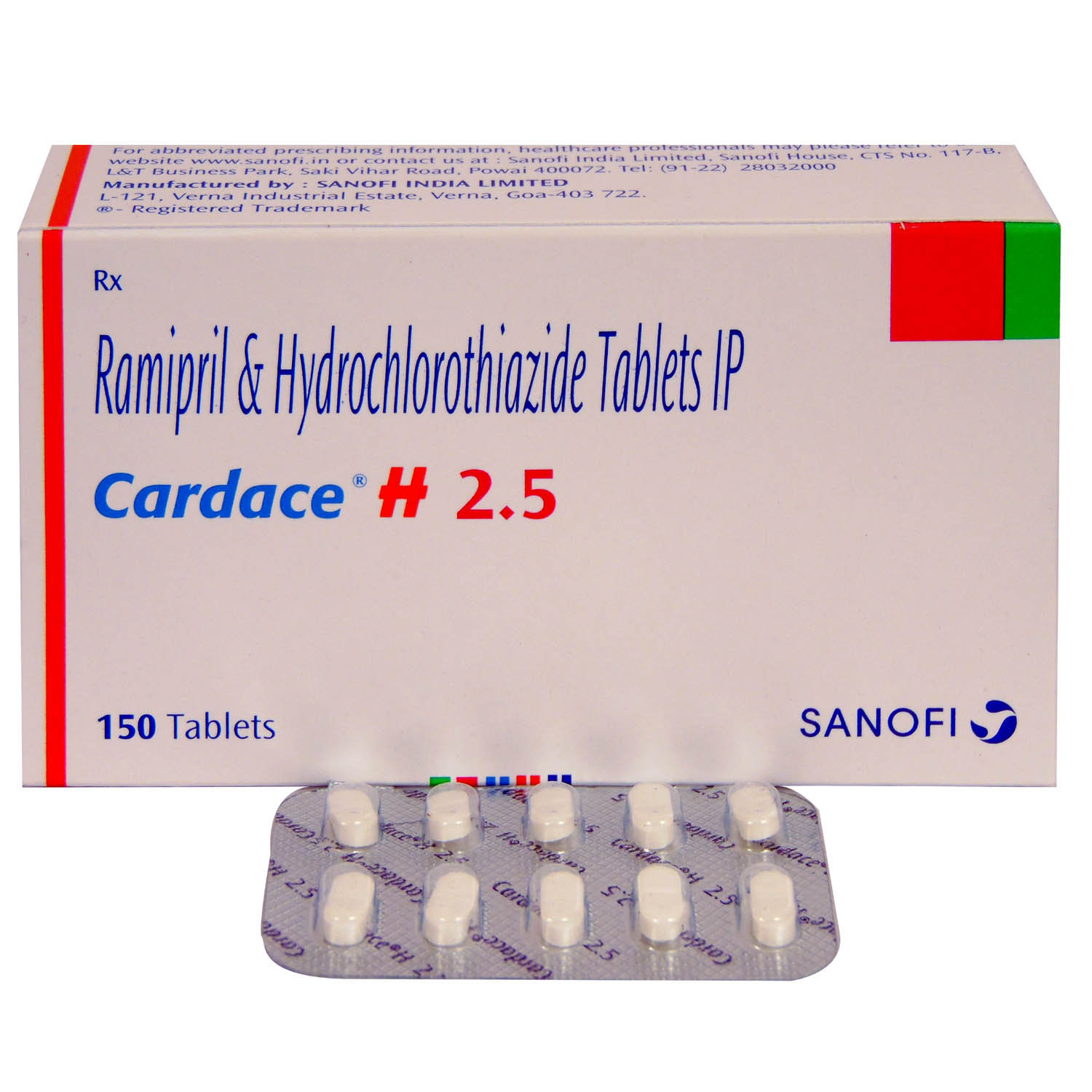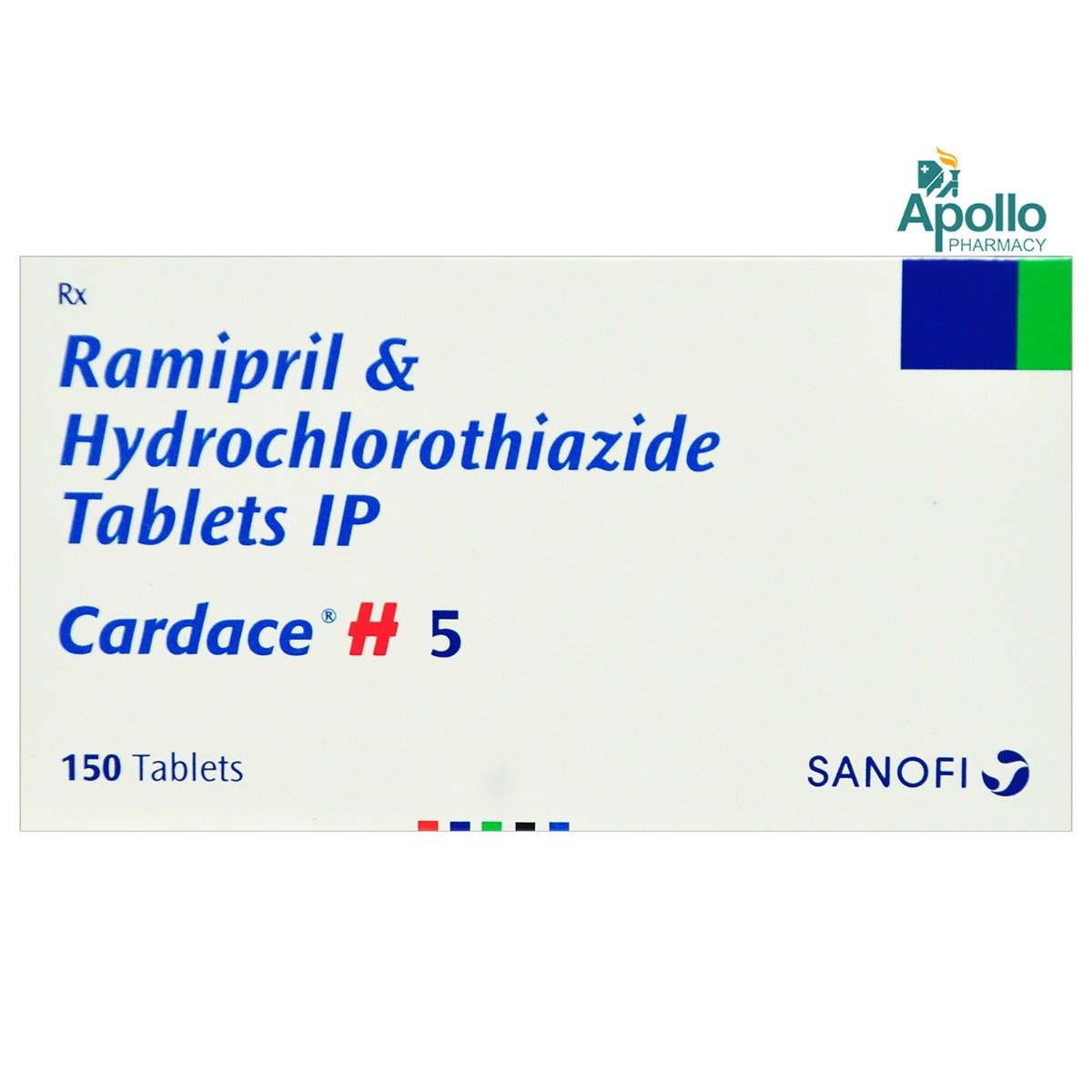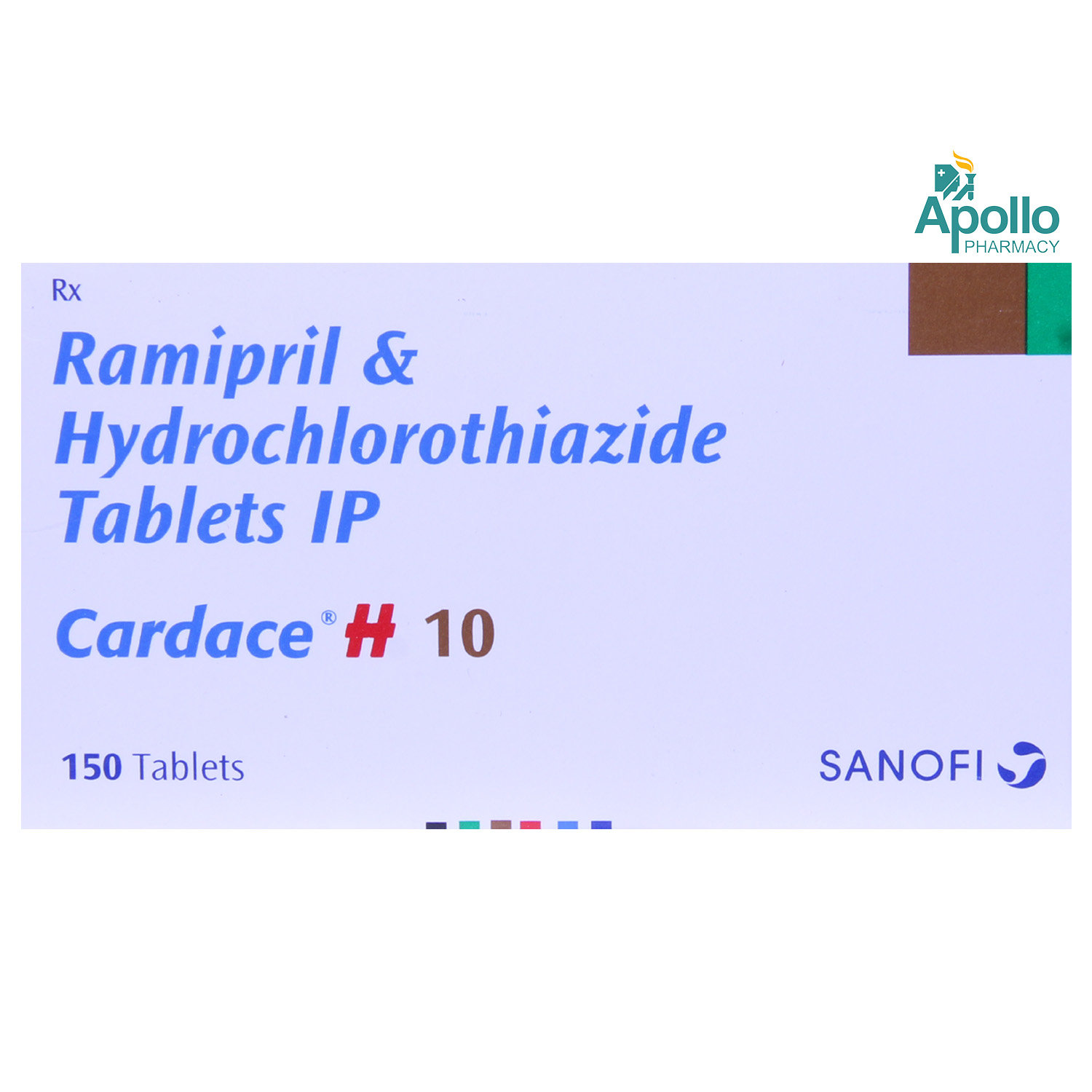Ramipril+hydrochlorothiazide
About Ramipril+hydrochlorothiazide
Hydrochlorothiazide+ramipril is used to treat blood pressure. Hypertension (High blood pressure) is a condition in which the force exerted by the blood against the artery walls becomes so high that it causes health problems, such as heart disease.
Hydrochlorothiazide+ramipril contains Ramipril and Hydrochlorothiazide. Ramipril relaxes the blood vessels and improves blood flow. Hydrochlorothiazide works by increasing the amount of urine passed out from the kidneys.
Sometimes, you may experience headaches, tiredness, a slow heart rate, and nausea. Most of these side effects do not require medical attention and gradually resolve over time. However, if the side effects are persistent, reach out to your doctor.
Do not take Hydrochlorothiazide+ramipril if you are allergic to any of its components. Hydrochlorothiazide+ramipril is not recommended in pregnancy and lactation. Keep your doctor informed about your health condition and medications to prevent any interactions.
Uses of Ramipril+hydrochlorothiazide
Medicinal Benefits
- Hydrochlorothiazide+ramipril contains Ramipril and Hydrochlorothiazide, which lower and maintain healthy blood pressure levels.
- By controlling hypertension, it helps prevent serious cardiovascular events such as heart attack, stroke, and heart failure.
- Ramipril, an ACE inhibitor, blocks the production of angiotensin II, which relaxes and widens blood vessels to improve blood flow.
- Hydrochlorothiazide acts as a diuretic, increasing urine output to remove extra salt and water from the body, thereby reducing fluid retention (oedema).
- By lowering both blood pressure and fluid buildup, Hydrochlorothiazide+ramipril helps the heart pump blood more efficiently.
- It helps relieve swelling associated with heart, liver, kidney, or lung disorders by reducing excess fluid accumulation.
- The combined action of both ingredients maintains optimal circulation and prevents strain on the heart and arteries.
Directions for Use
- Take Hydrochlorothiazide+ramipril with or without food as advised by your doctor.
- It is advised to take Hydrochlorothiazide+ramipril once daily in the morning; however, follow your doctor’s recommendation regarding the dosage and duration.
- Swallow Hydrochlorothiazide+ramipril as a whole with a glass of water.
- Do not crush, chew, or break it.
Storage
Side Effects of Ramipril+hydrochlorothiazide
- Feeling dizzy or lightheaded
- Headache
- Diarrhoea
- Being sick
- Mild skin rash
- Blurred vision
- Hypotension
- Nausea (feeling sick)
Drug Warnings
- Do not take Hydrochlorothiazide+ramipril if you are allergic to any of its components, or if you have low blood pressure (hypotension), cardiogenic shock (sudden stopping of blood flow to the heart), anuria (patients with nil urine output), or aortic stenosis (heart valve problem).
- Inform your doctor if you have had a heart attack, diabetes, kidney disease or liver disease
- Consult your doctor if you are pregnant, planning to get pregnant or breastfeeding.
- Do not consume alcohol with Hydrochlorothiazide+ramipril as it may increase the risk of low blood pressure.
- Avoid potassium supplements with Hydrochlorothiazide+ramipril as they may lead to high potassium levels in the blood
- Let your doctor know if you are taking any other medicines, including supplements or herbal products.
Drug Interactions
Drug-Drug Interactions: Hydrochlorothiazide+ramipril may interact with other diuretics, blood pressure-lowering drugs (aliskiren, metoprolol, sacubitril), anti-epilepsy medicines (carbamazepine, phenobarbital), anti-depression medicines (lithium), immune-suppressing drugs (cyclosporine), anti-diabetic drugs (metformin) and painkillers (ibuprofen, aspirin), anti-gout drugs (allopurinol), pain killers (diclofenac, ibuprofen), potassium supplements, birth control pills (drospirenone), immune system affecting drugs (everolimus, sirolimus). If you are taking any of the above, speak with your doctor.
Drug-Food Interactions: You are recommended not to consume alcohol along with Hydrochlorothiazide+ramipril to avoid unpleasant side effects.
Drug-Disease Interactions: Hydrochlorothiazide+ramipril should not be given to people with cardiogenic shock (when the heart fails to pump required blood to the body), heart valve problem (stenosis), low blood pressure (hypotension), coronary heart disease, liver disease, or heart failure, gout, sensitive skin to sunlight, low serum potassium (hypokalemia), patients with nil urine output (anuria), etc.
Drug-Drug Interactions Checker List:
Safety Advice

Alcohol
cautionHydrochlorothiazide+ramipril may enhance the hypotensive (low blood pressure) effect if alcohol is taken along with it. For better advice, you should consult your doctor about whether you can take Hydrochlorothiazide+ramipril with alcohol.

Pregnancy
unsafeThe use of Hydrochlorothiazide+ramipril or any ACE inhibitors (Ramipril) is usually contraindicated during the second and third trimesters of pregnancy. It may cause harm to the developing fetus. Hence, you should always consult your doctor before using Hydrochlorothiazide+ramipril.

Breast Feeding
cautionUse of Hydrochlorothiazide+ramipril is not recommended during the breastfeeding stage.

Driving
cautionDrive with caution, Hydrochlorothiazide+ramipril may cause blurry vision, and dizziness or weariness may occur.

Liver
cautionRare elevation in the liver enzymes (like bilirubin) has been observed while taking Hydrochlorothiazide+ramipril, so it must be taken with caution. If you have a history of liver diseases/conditions, the dose may have to be adjusted by your doctor.

Kidney
cautionHydrochlorothiazide+ramipril to be taken with caution, especially in case of severe kidney disease. The dose may have to be adjusted by your doctor. Hydrochlorothiazide+ramipril should be given with precaution in hemodialysis conditions.

Children
cautionHydrochlorothiazide+ramipril is not recommended for children. The safety and effectiveness of Hydrochlorothiazide+ramipril have not been established in children due to limited testing of this drug on children by competent authorities worldwide. If necessary, your doctor will decide whether to give Hydrochlorothiazide+ramipril or not.
Habit Forming
Diet & Lifestyle Advise
- Keep your weight under control with a body mass index (BMI) of 19.5-24.9.
- Do regular physical activity or exercise for at least 150 minutes per week, or about 30 minutes most days of the week. Doing this can help lower your raised blood pressure by about 5 mm Hg.
- Opt for a diet rich in whole grains, fruits, veggies, and low-fat dairy products.
- Limit sodium chloride (table salt) intake in your daily diet to 2300 mg per day or less than 1500 mg is ideal for most adults.
- If you are taking alcohol, then only one serving for women and two servings is advisable.
- Quitting smoking is the best strategy to lower the risk of heart disease.
- Avoid chronic stress, as it can raise your blood pressure. Try to enjoy and spend time with your loved ones to cope with stress and practice mindfulness techniques.
- Monitor your blood pressure daily, and if there is too much fluctuation, immediately contact your doctor.
- Including heart-healthy omega-3 fatty acid acid-containing foods in your daily diet.
- Use low-fat cooking oil like olive oil, soybean oil, canola oil, and coconut oil to lower your elevated blood pressure.
Special Advise
- Diagnostic tests like complete blood count (CBC), blood sodium and potassium levels, kidney function, and liver function should be closely monitored while taking treatment with Hydrochlorothiazide+ramipril to check for side effects and treatment progress.
- Regular blood tests and blood pressure monitoring are recommended while taking Hydrochlorothiazide+ramipril.
- Drink a lot of fluids as Hydrochlorothiazide+ramipril can cause dehydration.
Patients Concern
Disease/Condition Glossary
Hypertension: Hypertension is a chronic condition in which blood pressure is too high. This condition can lead to hardened arteries (blood vessels), decreasing the blood and oxygen flow to the heart. High blood pressure (hypertension) can cause chest pain (angina), a heart attack (when the blood supply to the heart is blocked), brain damage (stroke), and kidney failure.
FAQs
Hydrochlorothiazide+ramipril is used to treat hypertension (high blood pressure).
Hydrochlorothiazide+ramipril contains Ramipril (blood pressure-lowering agent) and Hydrochlorothiazide (diuretic or water pill). Ramipril is an angiotensin-converting enzyme or ACE inhibitor that lowers high blood pressure by blocking a naturally occurring substance known as angiotensin II (which tightens your blood vessels). It allows these constricted blood vessels to relax and, therefore, helps lower high blood pressure. On the other hand, Hydrochlorothiazide works by increasing the amount of urine passed out from the kidneys. It effectively reduces excess fluid overload in the body and treats oedema (swelling) associated with heart, liver, kidney, or lung disease. This reduces the heart's workload and makes the heart more efficient at pumping blood throughout the body. Thus, both help lower high blood pressure and reduce the chances of heart attacks or strokes.
Yes, Hydrochlorothiazide+ramipril can cause dizziness. It is advised to avoid driving or operating any heavy machinery while taking Hydrochlorothiazide+ramipril. In case you feel dizzy or lightheaded, it is recommended to rest for some time until you feel better.
It is advised to continue your medicine even after your blood pressure is under control or becomes normal, as blood pressure can shoot up at any time. If you have any discomfort, please consult your doctor immediately.
If you forget to take Hydrochlorothiazide+ramipril at any time, take it as soon as you remember, then continue to take it at the usual times. Do not take a double dose to make up for a forgotten dose.
No, it is a prescribed drug given by a physician to prevent specific medical conditions. Taking it on your own can cause unwanted side effects.
Yes, in some cases, Hydrochlorothiazide+ramipril may affect your serum potassium level, so consult your doctor before using potassium supplements or its salt substitutes.
Hydrochlorothiazide+ramipril should not be used if you have a history of a serious allergic reaction, including swelling of the face/lips/tongue/throat (angioedema) and an inability to pass urine. Before going outdoor in the sun, try to wear sunscreen (SPF) and avoid sunlamps and tanning booths as prolonged intake of Hydrochlorothiazide+ramipril may cause your skin to be sensitive to the sunlight.
Yes, if you have diabetes, Hydrochlorothiazide+ramipril may change your blood sugar level, so check your blood sugar regularly as directed. Tell your doctor if you have high blood sugar (hyperglycemia) symptoms like increased thirst/urination or signs of low blood sugar (hypoglycemia) such as sudden sweating, shaking, fast heartbeat, hunger, blurred vision, dizziness, or tingling hands/feet. Your doctor might adjust your dose of Hydrochlorothiazide+ramipril.
The common side effects of Hydrochlorothiazide+ramipril include headaches, tiredness, slow heart rate, and nausea. Most of these side effects gradually resolve over time; however, if they persist, please inform your doctor.
No, you should not stop treatment with Hydrochlorothiazide+ramipril even if you feel an improvement in your symptoms because high blood pressure often has no symptoms and can shoot up at any time. Continue taking it for as long as it has been advised by your doctor.
Yes, you can take Hydrochlorothiazide+ramipril every day if advised by the doctor. Just make sure to follow your doctor’s instructions regarding how long to use it. Taking it for years on your own without your doctor’s approval could be fatal.






